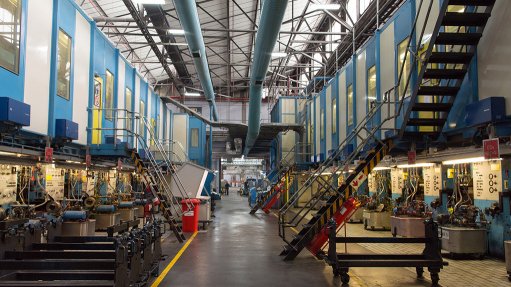
The downturn in South Africa’s private sector continued in December, with output declining at an accelerated pace and new business falling for the sixth time in seven months, the Standard Bank South Africa Purchasing Managers Index (PMI) has shown.
Released on Wednesday, the data, which was compiled by financial information and services company Markit, revealed that further job shedding was reported and companies lowered their buying activity, while average selling prices rose at a faster pace, despite input cost inflation slowing fractionally.
This was highlighted by the seasonally adjusted PMI falling from 49.6 to 49.1 in the last month of the year.
The PMI – a composite index – was calculated as a weighted average of five individual subcomponents: new orders (30%), output (25%), employment (20%), suppliers’ delivery times (15%) and stocks of purchases (10%), with readings above 50 signalling an improvement in business conditions on the previous month, and readings below 50 indicating a deterioration.
The bank noted in a statement that December’s data highlighted a continuation of the downturn in South Africa’s private sector that started in June and that the rate at which business conditions deteriorated was slightly stronger than that seen in November.
“South Africa’s private sector remained in the doldrums in December, thereby continuing the trend that has defined the second half of 2015. Poor market conditions and a lack of demand were some of the factors weighing on the country’s’ performance, according to survey respondents.
“With business outstanding falling further and conditions in the sector showing no signs of immediate improvement, companies continued to cut jobs, although the rate of job shedding remained marginal overall. Meanwhile, the price indices remained elevated in December, as the rand’s continued depreciation raises the cost for imported goods and services,” commented Markit economist Oliver Kolodseike.
According to anecdotal evidence, the bank continued, poor market conditions and a lack of demand were the main drivers behind the latest drop in output.
Meanwhile, companies reported a renewed decline in new business, following a stabilisation in the previous month. The decline was only marginal, however, while new orders from foreign markets also decreased in December.
As had been the case since September, employment in South Africa’s private sector fell marginally in December, while spare capacity was evident in the sector, as backlogs of work declined for the thirteenth successive month.
Input costs rose further in December, with the rate of inflation little-changed since the previous month, as a weaker increase in average staff costs offset a sharper rise in purchase prices. Companies continued to pass on higher costs to their clients, as highlighted by a rise in output prices.
Subdued demand remained one of the main reasons for companies to reduce their buying activity in December, with lower input buying, in turn, contributing to a further reduction in preproduction inventories, Standard Bank concluded.